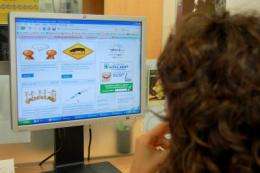Internet complicates doctor-patient relationships

Patients who ask their doctor about information they have read on the Internet, or webs that better inform them of their diagnosis, are no longer a rarity. A study undertaken by Spanish researchers reveals the advantages and disadvantages of online medical enquiries. Some 31% of doctors believe that the Internet complicates their relationship with patients and undermines their credibility.
Health information on the Internet is changing the relationship between doctors and patients. "Although the e-patient is a new phenomenon that is growing exponentially, very few studies analyse it from a doctor's point of view," José Joaquín Mira, main author of the working paper published recently in the journal entitled "Atención Primaria" (Primary Health Care in English) and a researcher at Miguel Hernández University explained to SINC.
As a result, the researchers analysed the opinion of 660 doctors who all work for the Spanish National Health System (330 in primary health care and 330 in hospitals) in the provinces of Alicante, Madrid, Zaragoza and Huesca. Results show that 96% of the doctors surveyed have been questioned by their patients about information they have read on the Internet. Furthermore, almost three out of every 10 professionals recommend websites to their patients.
The doctors who work in hospitals devote more time to the Internet, take more advantage of resident training resources and cooperate more with specific websites than their primary health care counterparts. But opinions coincide when the influence of the Internet on their relationship with patients is analysed. According to 31% of doctors, Internet complicates their relationship with patients and undermines their credibility.
As regards the advantages that the Internet provides to the people who go to the doctor, the first (42%) is that it helps patients to learn about their illness. However, only 20% of the doctors surveyed said that the Internet increased patient independence. "All the specialists agree that they do not believe the Internet favours patient independence". Moreover, many believe it can undermine the credibility of doctors. As a result, doctors do not normally suggest websites to their patients for complementary information, Mira clarifies.
E-Health Challenges
E-health encompasses all health care based on information and communication technologies, such as electronic medical records, telemedicine (physical and psychological tests which do not require the physical presence of the patient), information dissemination and online health care teams (professionals who cooperate and share information about patients using digital equipment).
"More than 40% of the Spanish population is estimated to browse the Internet in search of information about health", the researcher from the university in Alicante said. Mira states that despite being one of the most active areas of innovation and with great prospects for the future, "it also poses new unanswered questions and very few studies have been carried out to date."
Initiatives such as the recent press statement released by the European Commission regarding the Telemedicine Action Plan, which promotes coordination among countries, or the e-health scheme proposed by the Barack Obama government in the United States are a clear indication of how important these technologies are when it comes to facing the challenges of the health system.
More information: Mira Solves, José Joaquín; Llinás Santacreu, Gilberto; Lorenzo Martínez, Susana; Aibar Remón, Carlos. "Uso de Internet por médicos de primaria y hospitales y percepción de cómo influye en su relación con los pacientes". Atención Primaria; 41(6):308, June 2009.
Source: FECYT - Spanish Foundation for Science and Technology















